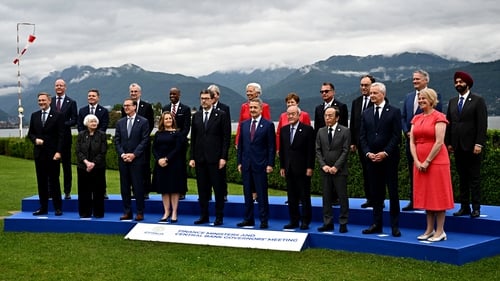Finance chiefs from the Group of Seven (G7) industrial democracies gathered in Stresa, Italy, for a two-day meeting starting on Friday, aiming to present a unified stance on providing financial aid to Ukraine and addressing China’s “unfair” industrial policies. Despite the ambition, comments from officials suggested that no concrete details would emerge regarding a U.S. push for a Ukraine loan backed by future income from approximately $300 billion in frozen Russian assets.
French Finance Minister Bruno Le Maire highlighted the proposal to utilize the windfall profits from these Russian assets for the years to come. He emphasized the need to compare proposals to determine the most convenient, efficient, and rapid approach that could be implemented. U.S. Treasury Secretary Janet Yellen mentioned that the loan could be around $50 billion, though no specific amounts have been agreed upon. Other G7 officials expressed caution, pointing out the complex legal and technical issues that need to be resolved.
Ukraine’s Finance Minister Serhiy Marchenko joined the discussions on Saturday. Ukraine continues to face significant challenges due to the ongoing Russian offensive, more than two years after Moscow’s invasion. German Finance Minister Christian Lindner acknowledged the many unresolved questions surrounding the loan proposal and indicated that no concrete decisions were expected during the Stresa meeting. However, negotiations will continue with the aim of making progress by the time G7 heads of government meet in Puglia, Italy, from June 13-15.
Another major topic of the meeting was addressing China’s growing export strength. The U.S. recently announced steep tariff hikes on various Chinese imports, including electric vehicle batteries, computer chips, and medical products. While the U.S. is not asking its G7 partners to implement similar measures, Yellen expressed the desire for Japan, Germany, France, Britain, Italy, and Canada to show solidarity with Washington.
French Finance Minister Le Maire emphasized the necessity of avoiding a trade war with China, describing it as an economic partner. However, he underscored the need to protect the G7’s industrial interests from unfair trade practices, high levels of subsidies, and China’s industrial overcapacities. Italian Economy Minister Giancarlo Giorgetti, chairing the Stresa gathering, suggested that Europe might eventually need to consider following the U.S. lead on tariffs.
Giorgetti noted that Italy had hoped to use the summit to revive stalled talks on a global minimum tax for multinationals. However, he acknowledged that the deal would not be finalized by June as planned, due to reservations from the U.S., India, and China. The global minimum tax, initially agreed upon by around 140 countries in 2021, has yet to be fully implemented.
The G7 also discussed a proposed global wealth tax on billionaires, a concept promoted by Brazil and France among the broader Group of 20 (G20) developed countries. Yellen stated that the U.S. could not support the current formulation of this wealth tax. Nevertheless, Le Maire asserted that France would continue to advocate for the scheme, stressing that it is unacceptable for the wealthiest to escape taxation and that everyone should contribute their fair share.
In summary, the G7 finance chiefs’ meeting in Italy focused on addressing the urgent need for financial aid to Ukraine and formulating strategies to counter China’s industrial policies. While no concrete decisions were expected during this initial gathering, ongoing negotiations and future meetings aim to resolve the complex issues at hand. The discussions also highlighted broader economic topics, including global taxation and the need for international cooperation to address systemic challenges.
















